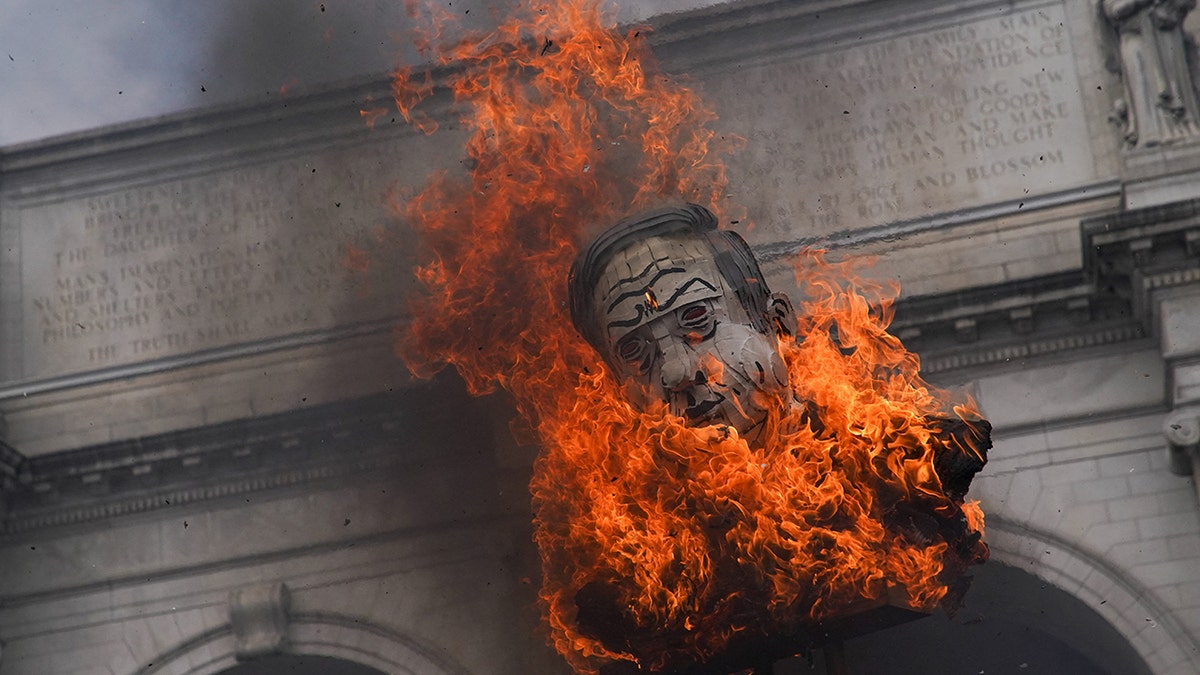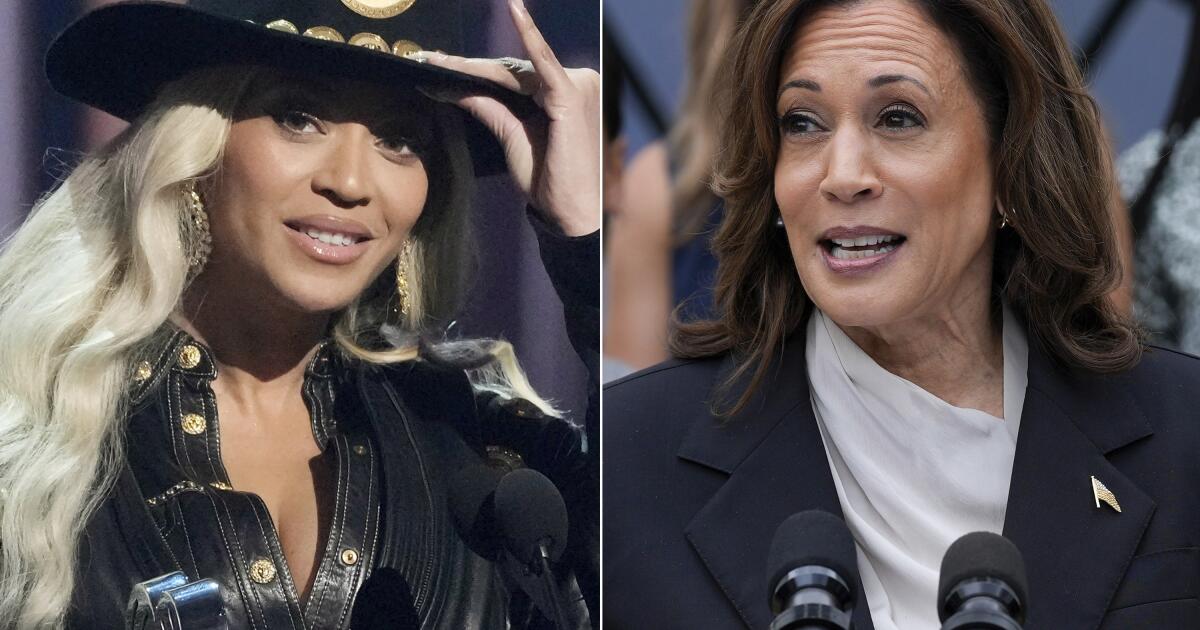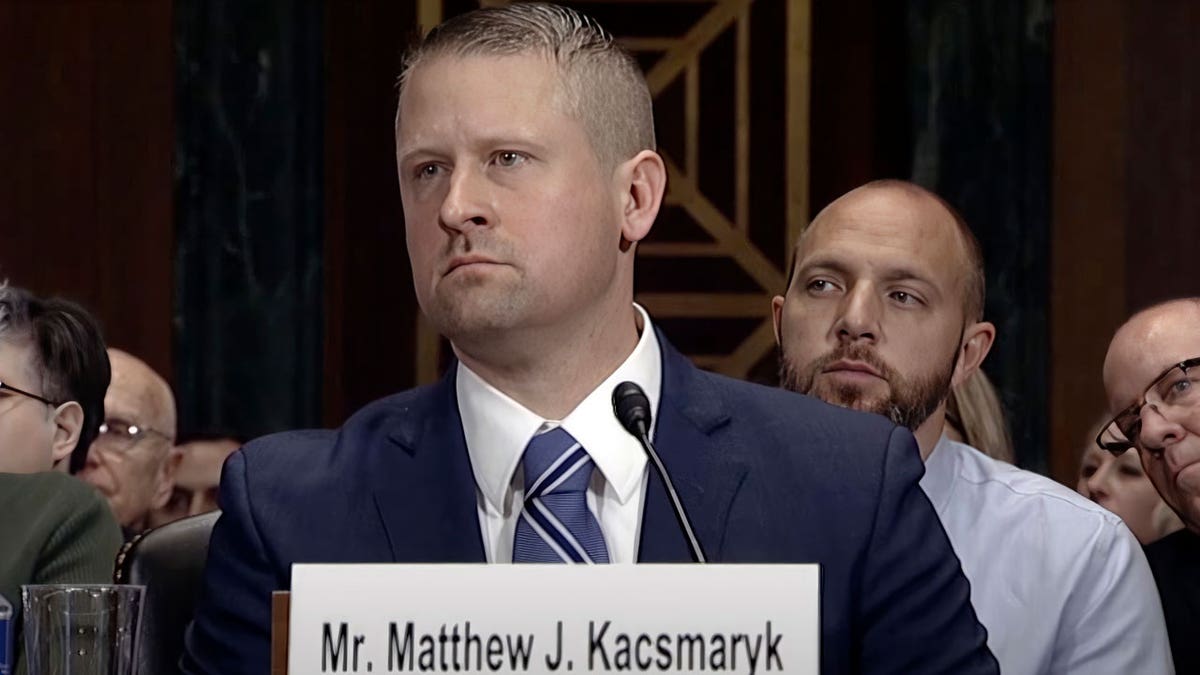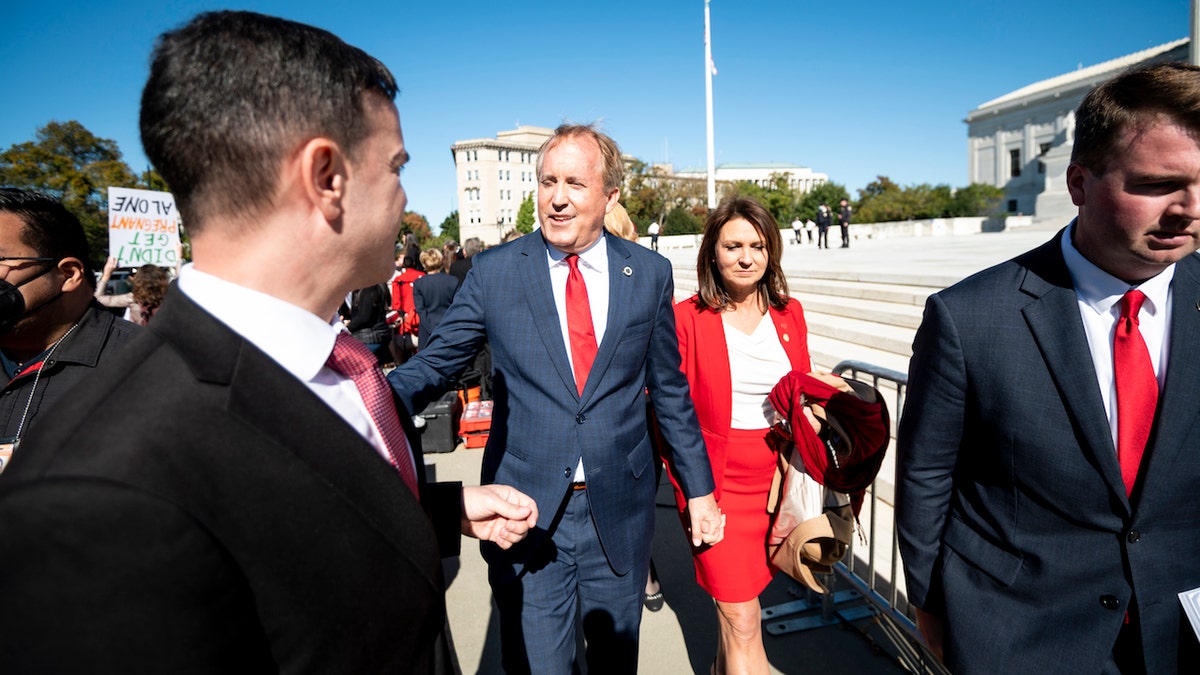Politics
Five ways the Supreme Court could rule for Trump on the 14th Amendment

Now that the Supreme Court has heard arguments in the case of President Trump and the 14th Amendment, it seems clear which side will win. The big question is what route the justices will take to allow him onto the ballot.
In the course of more than two hours of oral arguments Thursday, eight justices advanced at least five paths they might take to rule in Trump’s favor.
Only Justice Sonia Sotomayor seemed to seriously entertain the idea of ruling against him.
Here’s a look at where the court may end up.
What’s at issue
In December, the Colorado Supreme Court ruled that Trump was ineligible to appear on that state’s ballot because of the 14th Amendment, which was adopted after the Civil War. The amendment’s Section 3 reads:
“No person shall be a Senator or Representative in Congress, or elector of President and Vice-President, or hold any office, civil or military, under the United States, or under any State, who, having previously taken an oath, as a member of Congress, or as an officer of the United States, or as a member of any State legislature, or as an executive or judicial officer of any State, to support the Constitution of the United States, shall have engaged in insurrection or rebellion against the same, or given aid or comfort to the enemies thereof. But Congress may by a vote of two-thirds of each House, remove such disability.”
The amendment was designed to keep former Confederates from regaining power in the U.S. government, but it still has effect and covers Trump, the Colorado court ruled.
The decision had four key elements:
- As president, Trump had “taken an oath … as an officer of the United States” and is therefore covered by the amendment’s language.
- Based on a five-day hearing in a Colorado trial court, the attack on the U.S. Capitol on Jan. 6, 2021, was an “insurrection.”
- Trump “engaged” in that insurrection through his words and deeds.
- Under the terms of the amendment, he is ineligible to “hold any office … under the United States,” including the presidency.
The U.S. Supreme Court justices seemed skeptical of all four elements.
Who gets to decide?
The argument that appeared to attract the most support among the justices questioned the state’s power to decide the case at all.
“Why should a single state have the ability to make this determination, not only for their own citizens but for the rest of the nation?” Justice Elena Kagan asked Jason Murray, the lawyer representing the voters who challenged Trump’s eligibility. “That seems quite extraordinary, doesn’t it?”
Murray insisted that Colorado was deciding only for its citizens and its ballots. What the state did was no different from what others have done in excluding candidates who were too young to hold office or weren’t born in the United States, he said.
Kagan was clearly skeptical. A ruling upholding Colorado’s decision would have nationwide impact, she said.
“There are certain national questions where states are not the repository of authority,” she said. “What’s a state doing deciding who other citizens get to vote for for president?”
The 14th Amendment was “designed to take away powers from the states” after the Civil War, she said later, when Shannon Stevenson, the lawyer for Colorado, defended the ruling. It would be odd for it to be interpreted to allow every state to go its own way, Kagan said.
Justice Ketanji Brown Jackson, like Kagan, among the three Democratic appointees on the court, similarly questioned the authority of states to make their own decisions on eligibility.
Why would the writers of the 14th Amendment “design a system” that would allow “different states suddenly to say, ‘You’re eligible, you’re not?’” she asked.
Chief Justice John G. Roberts Jr. said that allowing a state-by-state approach inevitably would invite a court in a conservative state to rule that President Biden was ineligible.
“Surely there will be disqualification proceedings on the other side,” he said. “I would expect … a goodly number of states will say, whoever the Democratic candidate is, ‘You’re off the ballot.’”
Must Congress pass a law?
Justice Brett M. Kavanaugh pointed to a decision from 1869, the year after the 14th Amendment was ratified. Chief Justice Salmon P. Chase ruled that the disqualification of insurrectionists could not be used unless Congress passed specific legislation to implement it.
Chase issued that ruling, in what is known as Griffin’s case, in his role as an appeals court judge “riding the circuit,” as justices did in the 19th century. So it isn’t a binding Supreme Court precedent. But, as Kavanaugh noted, it is a guide to what at least some figures at the time believed the 14th Amendment to mean. The fact that Congress the following year passed a law to set up the sort of process Chase called for is further evidence, he said.
That 1870 law was repealed long ago, and there’s almost no chance the current, gridlocked Congress would pass implementing legislation now. So a ruling on those grounds would effectively end the case.
One risk would remain for Trump: There is still a law against insurrection on the books, and it provides that a person who is convicted is barred from office. But Trump has not been charged under that law.
A Trump exception?
For Trump’s lawyer, Jonathan Mitchell, a ruling on those grounds would be a partial victory, but the former president might risk future challenges.
The issue of whether Trump was qualified “could come back with a vengeance” after the election, warned Murray, the lawyer challenging him.
“Ultimately, members of Congress may have to make the determination after a presidential election, if President Trump wins, about whether or not he’s disqualified from office and whether to count votes cast for him,” Murray said.
To end the case once and for all, Mitchell urged the court to rule that Trump was never an “officer of the United States” and therefore is exempt from the 14th Amendment’s ban.
Mitchell insisted that those words have a specific, technical meaning in the Constitution: “‘Officer of the United States’ refers only to appointed officials,” not to elected officials like the president, he told the justices.
Some prominent legal scholars have scoffed at that, saying the Constitution should be read as a normal person would read it, not as a “secret code,” as one recent law review article put it.
Mitchell’s argument also ran into objections from some justices.
As Sotomayor noted, the argument feels like “a bit of a gerrymandered rule” because it would benefit only Trump: Alone among presidents, he was never an appointed federal official, a member of Congress or a state official before his election.
“It does seem odd that President Trump falls through the cracks, in a way,” Mitchell conceded. But, he insisted, that’s what the language of the amendment requires.
Is the presidency covered?
Jackson raised a related question: Is the presidency one of the offices the amendment bars an insurrectionist from holding?
The opening words of Section 3 list the specific offices from which an insurrectionist would be barred, she noted. It includes senator, representative and member of the electoral college but never mentions the president. Perhaps that was deliberate, because the writers of the 14th Amendment were mostly focused on preventing “the South from rising again” by keeping former Confederates out of Congress and state offices, she said.
At minimum, the language has “ambiguity,” she said. The court could interpret that ambiguous language to allow voters to make their own decisions.
Is it too early?
Mitchell pressed one other argument that appeared to interest some justices: The amendment says insurrectionists cannot “hold any office” but doesn’t say they can’t run for one.
That’s important, because Congress could vote before Inauguration Day to lift the disqualification. By barring Trump from the ballot, Colorado would, in effect, preempt his right to ask Congress for amnesty, he said.
When the justices convene Friday to discuss the case behind closed doors, they’ll see whether they can consolidate behind one of those arguments. They’re under pressure to act quickly, because the presidential campaign is well underway. If they can produce a unanimous ruling, it might lower the partisan temperature of an inflamed election year.

Politics
Park Police union says officers ‘did everything they could’ during DC anti-Israel riot

Following the protests at Union Station by anti-Israel agitators defacing federal property in protest of Israeli Prime Minister Benjamin Netanyahu’s address to Congress, a Park Police union is pushing back against criticism that only a few arrests were made.
Thousands of Hamas-sympathizing agitators descended on Washington, D.C., Tuesday, at one point defacing federal monuments with phrases in support of the terrorist group responsible for the Oct. 7 attacks in Israel, saying, “Hamas is coming.”
Twenty-three people were arrested at the protests, but some have suggested that number should have been higher.
Sen. Marco Rubio, R-Fla., posted on X, “How many more times are they going to allow leftist degenerates who support terrorism and hate America to vandalize property and attack police? There should have been hundreds of arrests today in D.C. not just 23.”
HOUSE REPUBLICANS REPLACE AMERICAN FLAGS AT UNION STATION AFTER ANTI-ISRAEL PROTESTS
The Columbus Memorial Fountain at Union Station during an anti-Israel protest on the day Israeli Prime Minister Benjamin Netanyahu addressed a joint meeting of Congress on Capitol Hill in Washington July 24, 2024. (Reuters/Seth Herald)
But the U.S. Park Police Labor Committee is pushing back.
“Our officers on the ground did everything they could to protect life and property. In fact, despite having only 29 officers available to mitigate damage — 29! — with no additional help from the Department of the Interior, we processed several arrests for charges ranging from assault on a police officer to destruction of government property,” Kenneth Spencer, chairman of the United States Park Police Fraternal Order of Police, said in a statement.
“That’s why it’s so disheartening to hear some members of Congress and members of the media, many of whom describe themselves as ‘champions’ of law enforcement, suggesting that officers gave protesters a ‘pass’ or that insufficient arrests were made.
“Nothing could be further from the truth. Anyone who truly cares to understand the problem would see that our officer staffing crisis is at the root of our agency’s mission readiness. A small unit of 29 officers arrested 10 individuals while being assaulted by a mob of thousands. We simply did not have the staffing or resources to accomplish a mass arrest operation.”
SEE IT: THE MOST DRAMATIC PHOTOS FROM WEDNESDAY’S PRO-HAMAS WASHINGTON, D.C. PROTESTS

An anti-Israel demonstrator sprays graffiti on the Christopher Columbus Memorial Fountain at Union Station on the day of Israeli Prime Minister Benjamin Netanyahu’s address to a joint meeting of Congress on Capitol Hill in Washington July 24, 2024. (Reuters/Nathan Howard)
At least one demonstrator, whose face was covered, was spotted by Fox News carrying what appeared to be the flag of the terrorist group Hamas while others were heard shouting “Allahu Akbar.”
KAMALA HARRIS REACTS TO ANTI-ISRAEL RIOTS AT DC’S UNION STATION

Anti-Israel demonstrators burn an effigy depicting Israeli Prime Minister Benjamin Netanyahu outside Union Station on the day of Netanyahu’s address to a joint meeting of Congress on Capitol Hill in Washington July 24, 2024. (Reuters/Nathan Howard)
The White House condemned the protests Wednesday evening, calling the chaos “disgraceful.”
“Identifying with evil terrorist organizations like Hamas, burning the American flag or forcibly removing the American flag and replacing it with another is disgraceful,” White House spokesperson Andrew Bates said in a comment to Fox News Digital Wednesday evening.
Politics
Ali: Kamala Harris has a campaign soundtrack: Beyoncé's 'Freedom'

Vice President Kamala Harris’ bid for the presidency has a soundtrack: Beyoncé’s “Freedom.”
The leading Democratic presidential candidate took the stage in her first visit to her Wilmington, Del. campaign headquarters and again during her first campaign rally in Wisconsin as the song played.
Now the cathartic anthem graces Harris’ first campaign ad, in which she says: “There are some people who think that we should be a country of chaos, of fear, of hate. But us? We choose something different: We choose freedom.”
Pit that against the musical number her competitor chose for his grand entrance on Night 3 of the Republican National Conference. Donald Trump walked out to James Brown’s “It’s a Man’s, Man’s, Man’s World,” a tone-deaf choice for a former president found liable for sexual abuse, who’s bragged about sexually assaulting women, a married man who paid hush money to a porn star and a former president who rolled back women’s reproductive rights 50 years with the repeal of Roe vs. Wade.
Maybe the Godfather of Soul would have endorsed Trump’s usage of his song, but Brown would be breaking with decades’ worth of musicians who’ve decried GOP candidates playing their tracks at rallies and booster events. Adele, Rihanna, R.E.M., the Rolling Stones, Prince, Neil Young, Guns N’ Roses and Queen are among the many artists who’ve spoken out against Trump using their tunes for campaign purposes.
Heart bristled when the McCain-Palin campaign used “Barracuda.” Tom Petty insisted George W. Bush back away from “I Won’t Back Down.” Bruce Springsteen decried Ronald Reagan’s appropriation of “Born in the U.S.A.”
Beyoncé, however, gave Harris her blessing to use “Freedom,” a single from her 2016 blockbuster album “Lemonade.” The song, which features guest rapper Kendrick Lamar, is an explosive expression of empowerment. At the time of its release, it spoke to public outcry around police killings of unarmed Black men and women — Eric Garner, Tamar Rice, Freddie Gray — and protests that were largely fueled by the ire of younger generations.
Whether Beyoncé was singing about the tyranny of a cheating spouse or racial injustice (or both), the song became an anthem for a new, potentially potent block of the American electorate.
For the first time, Gen Z and millennials could now account for as many votes as baby boomers and their elders, groups that have made up a majority of the electorate for decades.
Folks under 40 have grown up with Beyoncé and her ubiquitous work. Think of Beyoncé like the Who for boomers — their work is everywhere (Republican Sen. Rand Paul played the band’s anti-war hit “Baba O’Riley” when he campaigned in 2015) — or Nirvana for Gen X, except no one cares what we think. Whatever, nevermind.
The Harris campaign’s smart choice of music coincides with a willingness to lean into a meme culture that shot up organically around the 59-year-old VP since President Biden announced Sunday that he was dropping out of the race.
Pop star Charli XCX showed her support for Harris when she tweeted “Kamala IS brat.” The British singer is referring to the TikTok and Twitter edits of Harris’ image superimposed to songs from Charli XCX’s hit album “Brat.” The avalanche of memes come from a video clip in which Harris talks about her mother’s response to the hubris of youth: “You think you just fell out of a coconut tree? You exist in the context of all in which you live and what came before you.”
Right-wing social media used the quote to deride Harris as inarticulate and a “word salad” master, but liberal swaths of Gen Z have since reworked the clip into emojis and memes that celebrate Harris’ nonconformist approach. She’s become a viral sensation, in a good way, unlike J.D. Vance’s damning “single cat lady” memes and a cringey internet joke about encounters with couches.
It’s rare that relevant talent will shill for a Republican candidate. Case in point: Trump’s pop culture ambassadors at this year’s RNC were Kid Rock, Kanye’s ex Amber Rose and former WWE wrestler Hulk Hogan, whose big moment was ripping his shirt off and screaming “Let Trump mania run wild!”
Harris chose to let freedom ring, and she has Queen Bey behind her.
Politics
Texas sues Biden administration over program giving birth control to teens without parents' knowledge

Texas officials are challenging a recent order from President Biden’s administration that would allow schools to distribute birth control to teenagers without parental consent.
Texas Attorney General Ken Paxton announced Thursday that his office is suing the Biden administration over their 2021 change to Title X guidelines banning parental consent requirements for birth control services.
“By attempting to force Texas healthcare providers to offer contraceptives to children without parental consent, the Biden Administration continues to prove they will do anything to implement their extremist agenda — even undermine the Constitution and violate the law,” Paxton said in a statement.
TRUMP SAYS HE ‘WILL NEVER ADVOCATE IMPOSING RESTRICTIONS ON BIRTH CONTROL’ OR OTHER CONTRACEPTIVES
A woman takes the next pill from a monthly pack of contraceptive pills. (Annette Riedl/picture alliance via Getty Images)
The Texas legal battle began in Dec. 2021 when US District Judge Matthew Kacsmaryk ruled that Title X — the federal program that provides free, confidential contraception to anyone regardless of age, income or immigration status — violates parental rights and violates state and federal laws.
The case was argued by former solicitor general of Texas Jonathan Mitchell, representing father Alex Deanda, who said he was “raising each of his daughters in accordance with Christian teaching on matters of sexuality, which requires unmarried children to practice abstinence and refrain from sexual intercourse until marriage.”
SCHUMER PLANS VOTE ON ‘CONSTITUTIONAL RIGHT TO CONTRACEPTION’ IN BID TO PROTECT SENATE DEMOCRAT MAJORITY

Kacsmaryk, a Trump appointee, previously ruled that parents must be informed when birth control is provided to their children under 18 years old. (Senate Judiciary Committee via AP)
In response, the federal government updated guidelines to state that Title X projects “may not require consent of parents or guardians for the provision of services to minors, nor can any Title X project staff notify a parent or guardian before or after a minor has requested and/or received Title X family planning services.”
Paxton is now seeking a permanent injunction on this rule, which he claims defies the findings of the federal court.

Paxton and his wife Angela are pictured outside the Supreme Court. (Bill Clark/CQ-Roll Call, Inc via Getty Images)
Paxton filed the lawsuit in a federal court in Amarillo. It will likely be heard by Kacsmaryk, the same judge who previously ruled parents must be informed of birth control provided to their children.
-

 World1 week ago
World1 week agoOne dead after car crashes into restaurant in Paris
-

 Midwest1 week ago
Midwest1 week agoMichigan rep posts video response to Stephen Colbert's joke about his RNC speech: 'Touché'
-

 News1 week ago
News1 week agoVideo: Young Republicans on Why Their Party Isn’t Reaching Gen Z (And What They Can Do About It)
-

 Movie Reviews1 week ago
Movie Reviews1 week agoMovie Review: A new generation drives into the storm in rousing ‘Twisters’
-

 News1 week ago
News1 week agoIn Milwaukee, Black Voters Struggle to Find a Home With Either Party
-

 Politics1 week ago
Politics1 week agoFox News Politics: The Call is Coming from Inside the House
-

 News1 week ago
News1 week agoVideo: J.D. Vance Accepts Vice-Presidential Nomination
-

 World1 week ago
World1 week agoTrump to take RNC stage for first speech since assassination attempt













